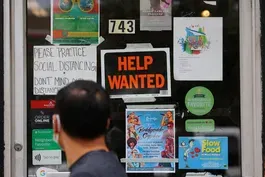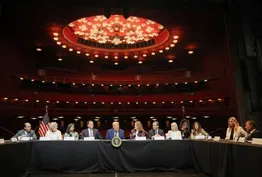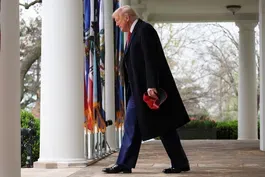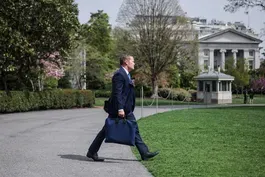
Brooks and Capehart on political reaction to Trump's tariffs
Clip: 4/4/2025 | 10m 17sVideo has Closed Captions
Brooks and Capehart on the political reaction to Trump's tariffs
New York Times columnist David Brooks and Washington Post associate editor Jonathan Capehart join Amna Nawaz to discuss the week in politics, including President Trump’s sweeping new tariffs draw criticism from leaders on both sides of the aisle, how voters will respond to the move and Sen. Cory Booker's record-breaking speech on the Senate floor.
Problems with Closed Captions? Closed Captioning Feedback
Problems with Closed Captions? Closed Captioning Feedback
Major corporate funding for the PBS News Hour is provided by BDO, BNSF, Consumer Cellular, American Cruise Lines, and Raymond James. Funding for the PBS NewsHour Weekend is provided by...

Brooks and Capehart on political reaction to Trump's tariffs
Clip: 4/4/2025 | 10m 17sVideo has Closed Captions
New York Times columnist David Brooks and Washington Post associate editor Jonathan Capehart join Amna Nawaz to discuss the week in politics, including President Trump’s sweeping new tariffs draw criticism from leaders on both sides of the aisle, how voters will respond to the move and Sen. Cory Booker's record-breaking speech on the Senate floor.
Problems with Closed Captions? Closed Captioning Feedback
How to Watch PBS News Hour
PBS News Hour is available to stream on pbs.org and the free PBS App, available on iPhone, Apple TV, Android TV, Android smartphones, Amazon Fire TV, Amazon Fire Tablet, Roku, Samsung Smart TV, and Vizio.
Providing Support for PBS.org
Learn Moreabout PBS online sponsorshipAMNA NAWAZ: President Trump's sweeping new tariffs have shocked the stock market and drawn criticism from leaders on both sides of the aisle.
To discuss the political aftermath of the penalties, we turn now to the analysis of Brooks and Capehart.
That is New York Times columnist David Brooks, and Jonathan Capehart, associate editor for The Washington Post.
Great to see you both.
JONATHAN CAPEHART: Hey, Amna.
AMNA NAWAZ: So we have talked a lot about what the White House has to say about these tariffs, the economic impacts so far, how the markets are responding.
I did ask Wisconsin Republican Senator Ron Johnson about these tariffs.
He has a heavy ag state, of course, a big manufacturing state as well, after markets closed yesterday.
Here's what he had to say.
SEN. RON JOHNSON (R-WI): This was a bold, but risky action the president has taken.
I, for one hope, he is correct.
I want him to succeed.
I want the American consumers to succeed.
I want Wisconsin manufacturers and farmers to succeed.
AMNA NAWAZ: David, bold, but risky.
Is it worth the risk?
DAVID BROOKS: In current Republican talk, that is full retreat.
DAVID BROOKS: I hope he succeeds in this crazy idea of his.
Yes, I think this is going to be -- well, A, I think it's literally the dumbest domestic policy of my lifetime.
The most -- of all the policies, they usually have some plausible argument.
A group of experts say, yes, this could work.
You really don't see that this time, with the confection of a few Trumpy -- I also think it's going to be a turning point for the Trump administration.
You can cut foreign aid, and voters don't really notice.
You can gut the Department of Education or whatever, and voters shrug.
But if you mess with their prices, add $4,000 to the price of a car, if you're an electrician and you have got all these contracts, big contracts out, you have now got to go back to the people you signed the contract with and try to renegotiate, because all your supplies costs are going up.
So it's -- the inflation rate, some economists think it's 3 to 5 percent.
It'll add -- that would put us up to 8, and then the disruption, the increased risk of a recession.
So people will definitely notice that, and they will absolutely take it out on the Trump administration.
AMNA NAWAZ: Jonathan, we have seen what the White House has said, right?
They're putting out statements of support.
They're standing firm.
They're saying we're not going to shift on this.
The president seems pretty relaxed.
The day after the stock said the worst drops since 2020, in the middle of the pandemic, the president woke up in Florida and went golfing.
Do you see them changing course on this?
JONATHAN CAPEHART: At least not yet.
We have now seen two four-digit drops in the stock market, and it hasn't changed the president's course at all.
And it's not just going to be the sticker shock in prices.
We're talking things maybe even more immediate for the American people, 401(k)s. The number of people who might have been counting on retiring in six months or a year, that's been upended.
People saving for their kids college years, other things that people were saving money for completely wiped out in just two days over what David -- I agree with David, the single dumbest domestic policy move I have ever seen.
And it doesn't seem to make any sense.
It makes no sense to the layperson.
It makes no sense to Wall Street experts.
And so if he's going to change course, it's going to require his Wall Street supporters plus members of Congress going to him and saying, Mr. President, we can -- this cannot continue.
You have to change course.
AMNA NAWAZ: We did start to see some fissures on this, right, David?
You saw some Republicans, four, in fact, Senators McConnell, Collins, Murkowski, and Tillis, vote with Democrats on a bill that would have allowed them to block tariffs on Canada.
So it passed the Senate.
It won't pass the House, so it's toothless to some degree.
We also saw a new bipartisan bill from Chuck Grassley and Senator Cantwell that would require the president to notify Congress within 48 hours of any new tariffs, trying to claw back some of that authority.
Does - - what does all of that say to you right now?
DAVID BROOKS: Well, I think it's too soon to tell whether the Republicans will really cave.
They only go against Trump if the political logic is in that favor.
We have learned that.
It won't be out of principle.
But -- and, right now, the political logic is still not in that favor.
You saw that Ron Johnson answer.
But say voters do get mad and Trump's approvals go down to -- where they are now, like 45, 43, down to 35, 33.
Then suddenly the political logic changes.
And when you see strong leaders fail, it's because of their own mistakes that then shift the political momentum.
And I hope -- Republicans are Americans.
And we love pluralism.
Trade isn't just about goods.
It's about the exchange of people.
It's about the exchange of ideas.
All dynamic societies are open societies, are crossroads societies.
And America used to be the ultimate crossroads society.
And this is changing all that.
And I hope there are some Republicans who, like, remember what they believed 10 years ago.
AMNA NAWAZ: How do you look at that, Jonathan?
JONATHAN CAPEHART: I mean, I think the Republican Party has given up on the exchange of peoples.
Just look at the president's immigration policies.
He has cut us off from our allies.
He has cut us off financially.
He has sealed the border from anybody who wants to come here, but, at the same time, deporting people who have been here from undocumented to green card holders to flat-out American citizens to El Salvadoran jails.
I look at what -- the big fight that is now starting, and that's over the reconciliation bill.
And I think that's the next shoe to drop on Republicans, because how are they going to finance making the Trump tax cuts permanent?
And the way they're going to do that is on the backs of the American people, going after Medicaid, Medicare and Social Security, earned benefits that people have paid in to their entire working lives.
And that's how they're going to pay for this.
And folks haven't, -- they're not focused on that just yet, but they will, because I think vote-a-Ramaswamy is happening tonight in the Senate, and it will get out and it will pass, and then it'll go to the House.
And then people will start to pay attention to, not only has the president's tariff policy shriveled up 401(k)s and skyrocketed prices, but also this next thing.
They're going to take other money away from us in order to finance tax cuts for his billionaire friends.
AMNA NAWAZ: You have both referenced sort of the bigger picture here about America on the world stage.
And, David, there's this idea that the entire globalized economy that was built up after World War II, I mean, the U.S. was at the center of it.
Now that the U.S. has sort of removed herself from that, is that era of globalization over?
DAVID BROOKS: For the time being.
I mean, it -- well, I should say globalization is still going to be here.
People need trade.
China needs trade.
Europe needs trade.
Latin America needs trade.
They're just going to circuit around the U.S. And so I have heard some Europeans today say, it's just like rewiring.
We used to have all these wires across The Atlantic, Europe, and the U.S., and we're going to trade.
Now we will just go to Latin America.
We will go around you.
We will go to China.
So globalization will still be around.
It just won't include us as much.
AMNA NAWAZ: Jonathan, there's a moment here in which we're seeing Democrats message on some of this, right?
We saw that bill that was to block tariffs on Canada that was led by Senator Tim Kaine.
We saw Senator Cory Booker take to the Senate floor in a record-breaking speech that he said, his office said, inspired thousands of people to call into his office.
You had hundreds of millions of people liking and commenting online.
And we also now have more than 1,000 planned protests coming up this weekend against President Trump in cities across the country.
Is there a momentum shift?
What's going on here with Democrats?
JONATHAN CAPEHART: Well, there is a momentum shift simply because everything we have seen come out of this administration is just moving people from apathy and complacency up and out into the streets, particularly with these demonstrations around the country tomorrow.
I think with Senator Booker -- what was so inspiring about what he did, one, it seemed to come from out of nowhere.
It seemed to -- it seemed to -- it was genuine, 25 hours and four minutes without any breaks.
The other thing is, I think two weeks ago, or maybe even three weeks ago, we were here when you were talking about the fight, Democrats need to fight.
And I was trying to articulate what that meant, really what Democrats wanted, even though they knew they would not succeed.
What Senator Booker did, that's exactly what they wanted him to do.
That - - they wanted someone in an elected position, someone of some stature, to stand up and say, explain what was going on, to give voice to what they were feeling about what was happening to their country, about who was doing it, about what we need to do to remind ourselves of who we are as a country.
And I think that's why Senator Booker's speech, his filibuster resonated so much.
Millions of people -- it was 350 million people liked it, I believe it was on -- on TikTok.
That's what people are going for.
And I think what Senator Booker has done, I think, has given people sort of the rhetorical armor they need for marches that are going to be happening around the country tomorrow, but going forward, because what we have seen this week is just one more horrible week on top of, what, 10 horrible weeks, if you care about this country.
AMNA NAWAZ: David, got about 30 seconds left.
I will give you the final word here.
DAVID BROOKS: Yes, well, I didn't like that fight word, because I think -- I have tried to say that it's about persuasion.
AMNA NAWAZ: Right.
DAVID BROOKS: And so you should try to persuade.
And so what Cory Booker did was try to persuade.
It was 25 hours of rhetoric on making a case for a thing.
And so I thought that was good.
The second final, quick thing about Cory Booker is, if Donald Trump is going to be all about gloom and carnage and threat, Cory Booker is about upbeat.
AMNA NAWAZ: Yes.
DAVID BROOKS: And that's a good -- good way to counter the vibe of Donald Trump.
AMNA NAWAZ: David Brooks, Jonathan Capehart, always great to see you both.
Thank you so much.
JONATHAN CAPEHART: Thanks, Amna.
Fired federal workers struggling to land new jobs
Video has Closed Captions
Clip: 4/4/2025 | 6m 44s | Fired federal workers struggling to land new jobs in tightening white-collar sector (6m 44s)
How NCAA's transfer portal transformed March Madness
Video has Closed Captions
Clip: 4/4/2025 | 6m 8s | How NCAA's transfer portal transformed March Madness (6m 8s)
Kennedy Center at a crossroads as it's pulled into politics
Video has Closed Captions
Clip: 4/4/2025 | 9m 4s | Kennedy Center faces a crossroads as it's pulled into partisan politics (9m 4s)
Trade war and tariffs drag markets to worst week in years
Video has Closed Captions
Clip: 4/4/2025 | 6m 59s | Trade war, tariffs and uncertainty drag markets to worst week in years (6m 59s)
Trump shakes up NSA amid pressure from right-wing activist
Video has Closed Captions
Clip: 4/4/2025 | 5m 52s | Trump abruptly shakes up NSA leadership amid pressure from right-wing activist (5m 52s)
Providing Support for PBS.org
Learn Moreabout PBS online sponsorshipSupport for PBS provided by:
Major corporate funding for the PBS News Hour is provided by BDO, BNSF, Consumer Cellular, American Cruise Lines, and Raymond James. Funding for the PBS NewsHour Weekend is provided by...
















